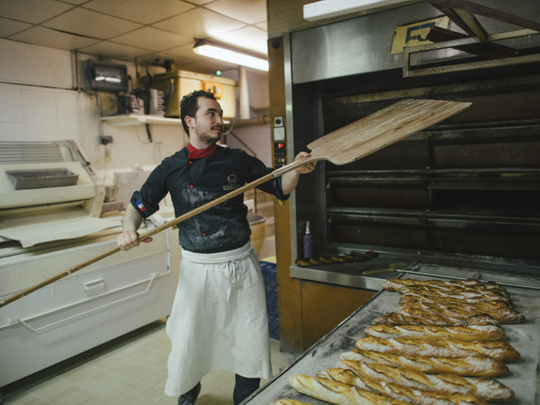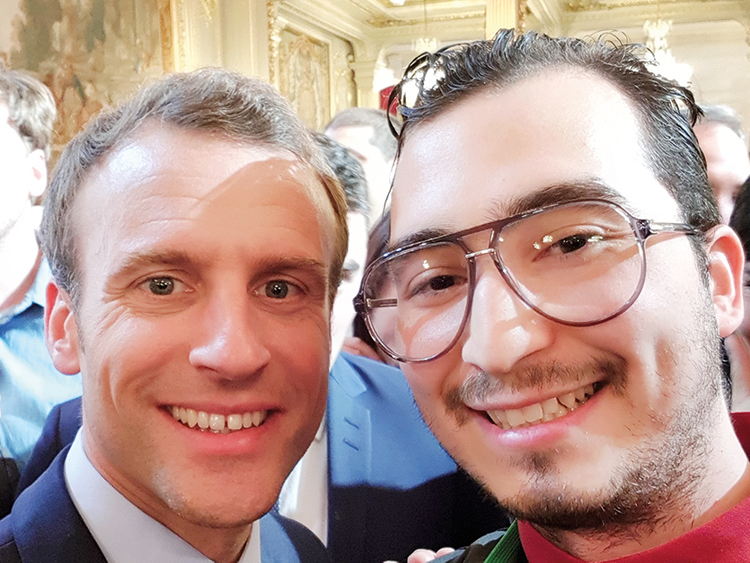
PARIS: There are in fact few things more closely associated with France than the baguette, that long crusty stick that announces its nationality like no other bread.
So the mastering of that symbol of Frenchness by Mahmoud M’seddi, an immigrant’s son and this year’s winner of the Grand Prize for Best Parisian Baguette, is about more than great baking. At a moment when President Emmanuel Macron is taking a toughening line against immigration, M’seddi’s triumph challenges the very notion of what it means to be French.
Ask him whether there was any significance in the fact that his father arrived from Tunisia more than 30 years ago, and he will snort an indignant denial: “I’m French. This is my home.”
As a loyal Frenchman, he has absorbed the classic outlook of the French Republic. It is assimilationist and not integrationist; there are no ethnic distinctions, only citizens of France. Mother France subsumes all identities into one.
With that in mind, M’seddi, a kinetic and good-humoured 27-year-old, conquered one of France’s revered bastions. And not only him. It is immigrants or their heirs who are in fact propping up the sacred tradition.
- Mahmoud M’seddi | In a selfie with French president Emmanuel Macron
French at heart
Last year’s best baguette winner, Sami Bouattour, is also the son of a Tunisian immigrant. Three years ago it was a baker of Senegalese origin, Djibril Bodian, a two-time winner. Two years before that it was another Tunisian.
This year, it was M’seddi who was the outsider beating the insiders at their own game. He now has the privilege of supplying to Elysee Palace, seat of the French presidency, with the bread of breads for a year. He showed a selfie of himself with a grinning President Emmanuel Macron to drive the point home.
Deep beneath a Left Bank sidewalk in Montparnasse, inside the spotless tile work space he calls his “laboratory,” Arab pop played on the radio on a recent day.
His carefully prepared dough metamorphosed into crusty baguettesem and M’seddi was a whirl of motion.
The phone rang, and M’seddi answered in Arabic. Yet he also upbraided a questioner when asked about his origins.
“People like to remind me of it, yeah, sure,” he said testily. “Me, I don’t make these distinctions. I couldn’t care less about it,” he said. The French tricolour flag adorns the sleeve of his baker’s coat.
“Look, I grew up here,” he said. “I studied here. I pay my taxes here. It’s true that Tunisia called me, after I won. They’re proud. But the Parisians are proud, too.” His customers can’t stop hugging and kissing him, he said.
His bread — rich, crusty and earthy — is very clearly superior to its industrial cousins that are the unsavoury Paris norm. The dark crust can be smelled from another room, an excellent sign. You taste wheat, not chemicals, when you bite into one of M’seddi’s baguettes.
“Look, I worked hard to get here,” M’seddi said.
“I see myself as an artist, as a magician,” he said. “I take a primary material, and I make something out of it. And I make people happy.”
A lot of people.
Opposite him, bakers were shaping dough, and next to him stood the mayor of Paris, the rector of Notre Dame, and the head chef of the Elysee Palace. Framing the scene was the intricate medieval bulk of Notre Dame.
“Outside of France, it is one of the principal symbols of France,” Thomasse told the crowd, and there was nobody to contradict him.
M’seddi, who works in his “laboratory” until midnight mixing dough, was initiated into the culture early on. His father, Mohammad — his “idol,” to whom “I owe everything” — gets up at 4am to make the bread in an associated bakery.
Some 1,200 boulangeries close in France every year. Boulangerie work is hard, and the elder M’seddi tried to keep his son out of it.
They put bread on our table
Guillaume Gomez, the Elysee’s ebullient head chef and himself the son of a Spanish immigrant, insisted there was no connection between national origin and baguette-making, even as he acknowledged that “those who succeed are the ones who really work hard.”
“That’s the real social ladder,” he said.
The Paris mayor, Anne Hidalgo, herself born in Spain, a Socialist on her party’s left and known as a champion of immigrants, drew a political lesson from M’seddi’s win.
“I find it extraordinary, because it’s not the first time,” Hidalgo said in a brief interview at the Bread Festival.
She depicted the triumph of immigrants as a rebuke to anti-immigrant movements like the National Front. “Not only do they not take bread from our mouths, they put bread in,” she said.












